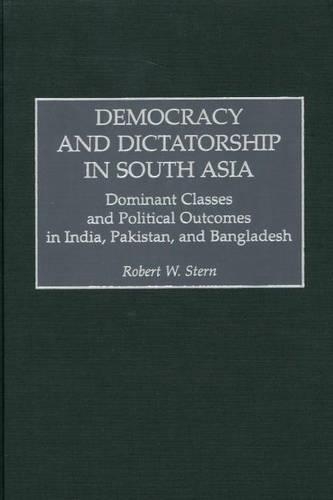
Democracy and Dictatorship in South Asia: Dominant Classes and Political Outcomes in India, Pakistan, and Bangladesh
(Hardback)
Publishing Details
Democracy and Dictatorship in South Asia: Dominant Classes and Political Outcomes in India, Pakistan, and Bangladesh
By (Author) Robert W. Stern
Bloomsbury Publishing PLC
Praeger Publishers Inc
30th November 2000
United States
Classifications
Tertiary Education
Non Fiction
320.954
Physical Properties
Hardback
208
Description
In reaction to British imperialism during the 19th and 20th centuries, Indian Muslims and Hindus imagined and invented their separate and distinct religious communities and communal nationalisms. These were institutionalized in the subcontinent's political systems by the British government in collaboration with Indian politicians. Stern argues that this production of communalism has been crucial in structuring the composition and organization of South Asia's politically dominant classes, and that they, in turn, have been crucial in determining parliamentary democracy's growth or atrophy on the subcontinent. In what became India, the overwhelmingly Hindu National Congress formed a coalition of professionals and landed peasants, later joined by industrialists, that was friendly to the development of parliamentary democracy. In its western provinces, Pakistan's legacy from British government was a ruling coalition of landlords and civilian and military bureaucrats that has continued to impede the development of parliamentary democracy. Until 1971, this coalition equated parliamentary democracy with the loss of their dominance to Pakistan's Bengali majority. Only among them, in Pakistan's eastern province, now Bangladesh, was there a politically dominant coalition of classes that was friendly to the development of parliamentary democracy. It had the ironic effect in Pakistan of entrenching the west's anti-democratic coalition. Dogged by the legacies of twenty-four years as Pakistan's subordinate province, disorganization among its dominant classes and a vanished rural base, the development of parliamentary democracy in Bangladesh has been slow and uneven.
Reviews
"A major contribution to modern political and sociological thought and the salience of its findings are not to be underestimated."-Professor Christian Aspalter The University of Hong Kong
[a] useful addition to the literature on the contrast between democracy and dictatorship in South Asia-U.S.I. Journal
[A]n interesting and substantive study of the conceptions of democracy and dictatorship in South Asia.-Contemporary South Asia
Stern provides a well-written, sophisticated, comparative analysis that will be of great interest to both generalists and specialists. Undergraduates through faculty and researches.-Choice
This is a delightfully tight, confident book....a persuasive analysis of what makes the regimes of South Asia tick, incisively written by a witty scholar who has observed the region, and heard most of the arguments about it, for the past forty years.-South Asia
"a useful addition to the literature on the contrast between democracy and dictatorship in South Asia"-U.S.I. Journal
"An interesting and substantive study of the conceptions of democracy and dictatorship in South Asia."-Contemporary South Asia
"[a] useful addition to the literature on the contrast between democracy and dictatorship in South Asia"-U.S.I. Journal
"[A]n interesting and substantive study of the conceptions of democracy and dictatorship in South Asia."-Contemporary South Asia
"Stern provides a well-written, sophisticated, comparative analysis that will be of great interest to both generalists and specialists. Undergraduates through faculty and researches."-Choice
"This is a delightfully tight, confident book....a persuasive analysis of what makes the regimes of South Asia tick, incisively written by a witty scholar who has observed the region, and heard most of the arguments about it, for the past forty years."-South Asia
Author Bio
ROBERT W. STERN is a Senior Research Fellow at Macquarie University in Sydney. For more than thirty years his professional life has centered on the study of modern South Asia. He is the author of four books, including Changing India (1993) and a number of articles.
